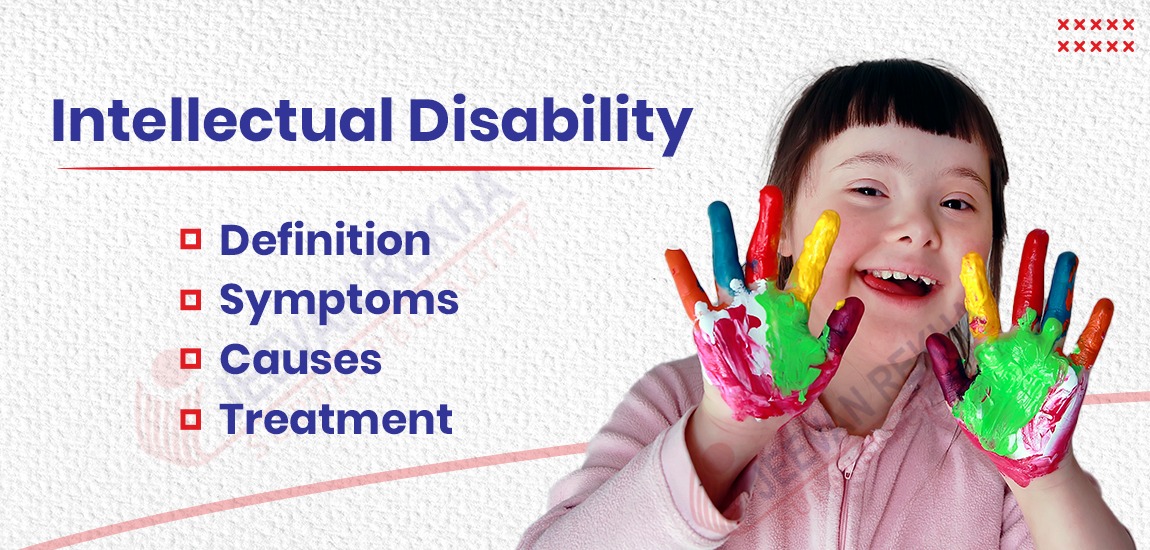
- By JRSH Admin
- In Health and Tips,
- Posted July 11, 2023
Intellectual Disability: Definition, Symptoms, Causes, and Treatment
What Is an Intellectual Disability?
An intellectual disability, also known as an intellectual developmental disorder or mental retardation, is a neurodevelopmental condition characterized by limitations in cognitive functioning and adaptive behavior. It is typically diagnosed during childhood or adolescence and persists throughout a person's lifetime.
Intellectual disability is defined by significant limitations in intellectual functioning, which refers to a person's general mental capacity, including skills such as reasoning, problem-solving, learning, and judgment. These limitations are often assessed using standardized intelligence tests, such as an IQ (intelligence quotient) test, where an IQ score below a certain threshold (typically around 70 or below) is considered indicative of intellectual disability.
In addition to limitations in intellectual functioning, individuals with intellectual disability also demonstrate impairments in adaptive behavior. Adaptive behavior encompasses a range of skills necessary for independent functioning and daily life activities, such as communication, self-care, social skills, and the ability to navigate practical tasks and responsibilities.
It's important to note that intellectual disability is a heterogeneous condition, meaning that its severity can vary widely among individuals. It can range from mild, where individuals may have some difficulty in certain areas but can generally function independently with support, to severe or profound, where individuals may require significant assistance and support for daily activities.
Also read: Dementia: Symptoms, Types, Causes, Risk Factors, Diagnosis & Treatment
Types of Intellectual Disability
The severity of intellectual disability can vary widely, and individuals with this condition may require varying levels of support in their daily lives. Here are some types or classifications of intellectual disability:
- Mild Intellectual Disability: A person with mild intellectual disability usually has an IQ between 50 and 70. They may experience some difficulties with academic learning, language skills, and social interactions, but they can often achieve some degree of independence and may be able to live independently with support.
- Moderate Intellectual Disability: Moderate intellectual disability is characterized by an IQ range of 35-49. Individuals with this level of disability may have delays in motor skills development, communication difficulties, and challenges in academic learning. They usually require more support and supervision in daily activities.
- Severe Intellectual Disability: Severe intellectual disability is characterized by an IQ range of 20-34. Individuals with this level of disability often have significant delays in motor development, limited speech or communication abilities, and require extensive support and supervision in daily living skills.
- Profound Intellectual Disability: Profound intellectual disability is the most severe category, with an IQ below 20. Individuals with this level of disability often have significant challenges in cognitive functioning, communication, and physical development. They require constant support and supervision for daily activities and usually have complex medical and care needs.
Causes of Intellectual Disability
Intellectual disability can occur whenever something prevents the brain from developing typically. However, only about one-third of the time can a specific cause of intellectual disability be identified.
There are several causes of intellectual disability, including:
- Genetic conditions. These conditions include Fragile X syndrome and Down syndrome, among others.
- Problems during pregnancy. Alcohol or drug use, malnutrition, certain infections, or preeclampsia are all factors that can affect how the fetal brain develops.
- Problems during childbirth. A baby who is severely under-oxygenated during birth or who is born very early may develop an intellectual disability.
- Illness or injury. The development of intellectual disability can be triggered by illnesses like meningitis, whooping cough, or measles. It can also be brought on by severe neglect or abuse, severe malnutrition, infections in the brain, exposure to toxic substances like lead, severe head injury, or nearly drowning.
- None of the above. The cause of intellectual disability is unknown in two-thirds of all children.
Symptoms of Intellectual Disability
Here are some common symptoms and characteristics associated with intellectual disability:
- Intellectual functioning: Individuals with intellectual disability have below-average intellectual functioning, typically measured by intelligence quotient (IQ) tests. The cutoff for diagnosing intellectual disability is usually an IQ score below 70-75.
- Learning difficulties: People with intellectual disability may experience challenges in learning and acquiring new skills. They may have difficulty with reading, writing, mathematical concepts, and abstract thinking.
- Language and communication problems: Many individuals with intellectual disability have delayed language development. They may have difficulties understanding and using language, limited vocabulary, and trouble with expressive communication.
- Poor problem-solving and reasoning skills: Intellectual disability can affect a person's ability to think logically, solve problems, and reason abstractly. They may struggle with complex tasks and have difficulty planning and organizing.
- Memory deficits: Individuals with intellectual disability may have difficulties with both short-term and long-term memory. Remembering and retaining information can be challenging for them.
- Slow cognitive processing: People with intellectual disability may have a slower processing speed, which means it takes them longer to understand and respond to information or complete tasks.
- Poor social skills: Many individuals with intellectual disability struggle with social interactions and forming relationships. They may struggle with understanding social cues, interpreting facial expressions, and maintaining appropriate social behavior.
- Limited adaptive behavior: Adaptive behavior refers to the practical skills needed for daily living, such as self-care, communication, socialization, and problem-solving. People with intellectual disability may have delays in developing these skills.
- Behavioral challenges: Some individuals with intellectual disability may exhibit challenging behaviors, such as aggression, self-injury, hyperactivity, impulsivity, or difficulties with emotional regulation. These behaviors can vary widely and are often a result of frustration, communication difficulties, or environmental factors.
Diagnosis of Intellectual Disability
Several lab, diagnostic, and imaging tests can aid in diagnosis in addition to the tests and assessments for intelligence and adaptive behaviors. The potential tests vary according to your symptoms. Testing can assist your doctor in determining the root of the problem, which can help direct treatment.
Possible tests include:
- Lab tests of blood, urine, and more. These can reveal underlying factors that contribute to intellectual disability or other similar conditions.
- Genetic counseling. It can be prevented or limited to complications related to these underlying conditions by identifying genetic conditions that are causing or contributing to intellectual disabilities.
- Imaging tests. These are particularly useful for diagnosing conditions like cephalic disorders that involve variations in brain structure.
- Additional tests might be feasible depending on the illness you may have or that a medical professional suspect you may have. You can learn more about the potential tests and which ones your doctor recommends from your provider.
Also read: Phobias: Causes, Types, Symptoms & Treatment
Treatment of Intellectual Disability
The treatment of intellectual disability involves a multidimensional approach that focuses on addressing the individual's unique needs and promoting their overall well-being and quality of life. It typically involves a combination of interventions, therapies, support services, and accommodations tailored to the specific needs of the person with an intellectual disability. Here are some key aspects of treatment for intellectual disability:
- Early intervention: Early identification and intervention are crucial for maximizing a person's potential. Early childhood programs, such as early intervention services, can provide specialized support and therapies to promote developmental progress and address specific areas of need.
- Education and special services: Individuals with intellectual disability often benefit from special education services tailored to their unique learning needs. Individualized Education Programs (IEPs) can outline specific goals, accommodations, and support services, including speech therapy, occupational therapy, and behavioral interventions.
- Behavioral and psychological therapies: Behavioral therapies, such as Applied Behavior Analysis (ABA), can help individuals with intellectual disability develop essential life skills, improve communication, manage challenging behaviors, and promote social interactions. Other therapeutic approaches, such as cognitive-behavioral therapy (CBT), can address emotional and mental health concerns.
- Medication: In some cases, medication may be prescribed to manage co-occurring conditions or symptoms associated with intellectual disability, such as attention-deficit/hyperactivity disorder (ADHD), anxiety, or seizures. Medication should be carefully monitored and administered under the guidance of a healthcare professional.
- Support services and community integration: Supportive services, such as vocational training, supported employment programs, and independent living skills training, can help individuals with intellectual disability develop practical skills, enhance their independence, and promote community integration. Community-based programs and services can also provide social opportunities and recreational activities.
- Family involvement and support: Involving families in the treatment process is crucial. They can provide ongoing support, reinforce therapeutic strategies at home, and advocate for their loved one's needs. Family support groups and counseling can also provide valuable resources and emotional support.
- Assistive technology and accommodations: Assistive devices, adaptive tools, and technology can assist individuals with intellectual disability in enhancing their communication, mobility, and independence. Examples include augmentative and alternative communication (AAC) devices, visual aids, and environmental adaptations.
Visit US: Best Hospital in Jaipur
Tags
Blog Search
Latest Posts
-
Mild Heart Attack: How Serious Is It?
February 19, 2026 -
Skin Ulcers Uncovered: Causes, Types, Symptoms, and Healing Options
January 13, 2026 -
Is Coconut Water Safe During Pregnancy? Benefits, Risks & Myths
January 08, 2026 -
Dark Circles Under The Eyes: Causes, Home Remedies and Treatments
December 21, 2025 -
बर्ड फ्लू के लक्षण, कारण, उपचार और बचाव के उपाय जानें
December 04, 2025




